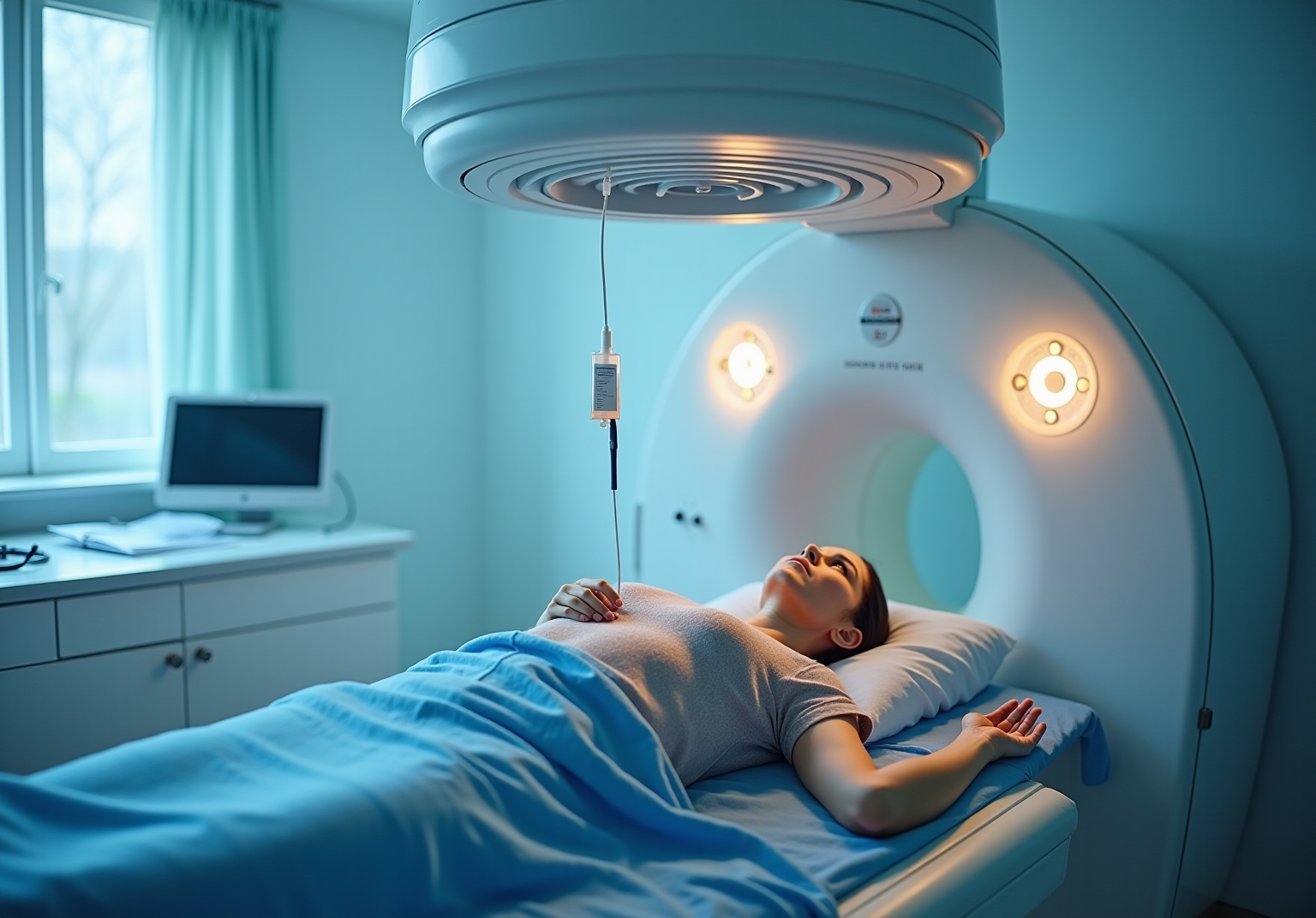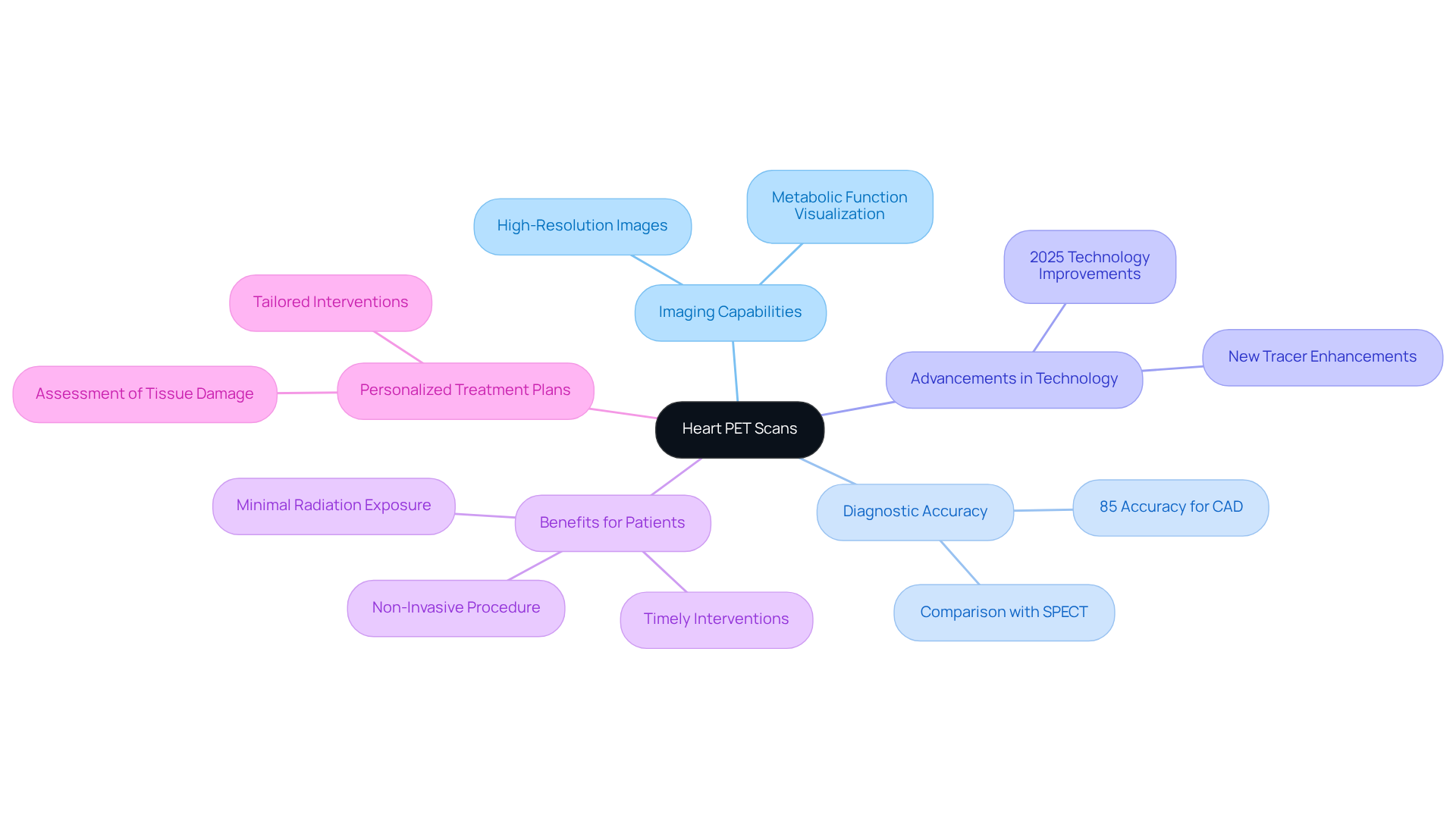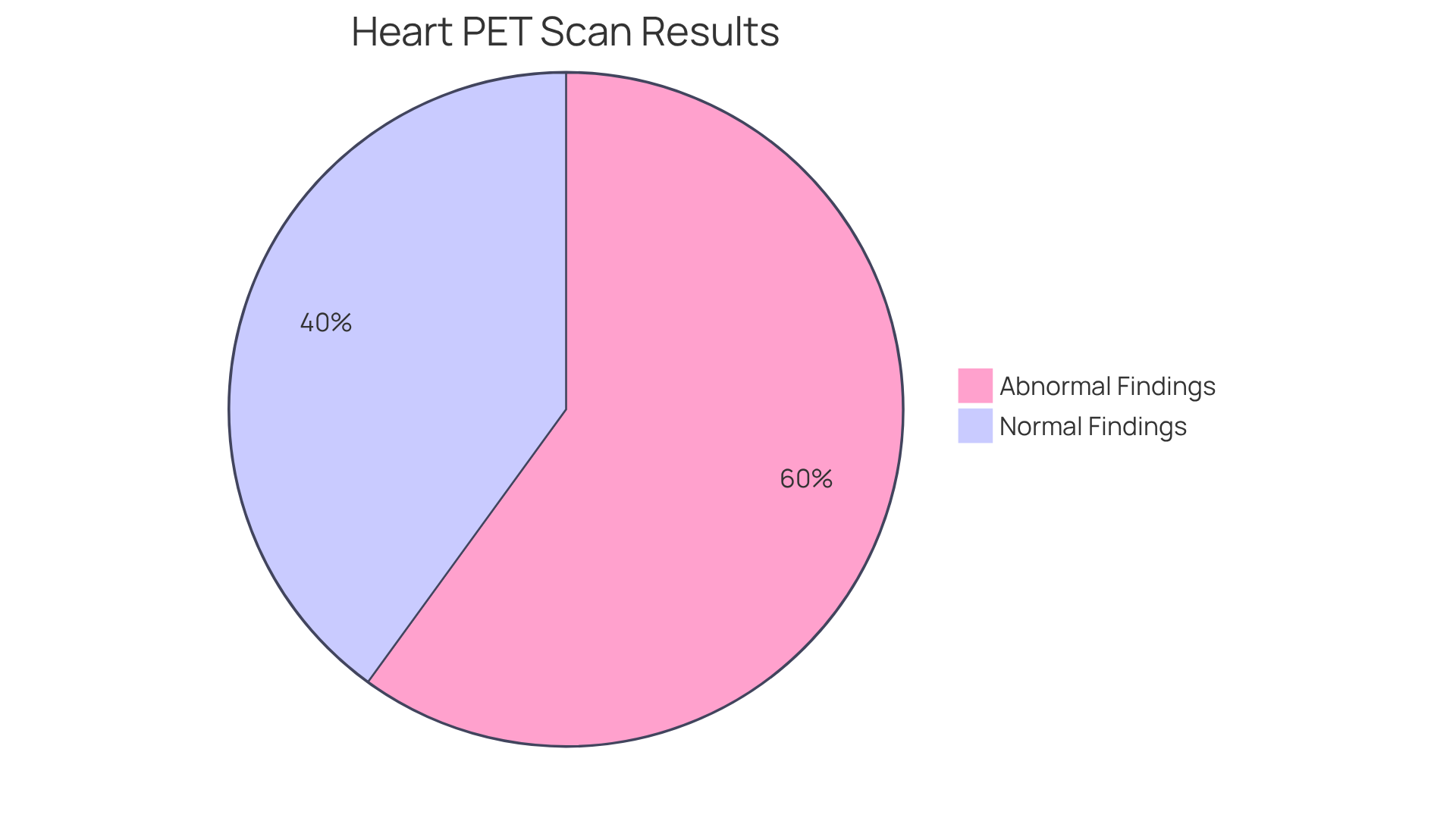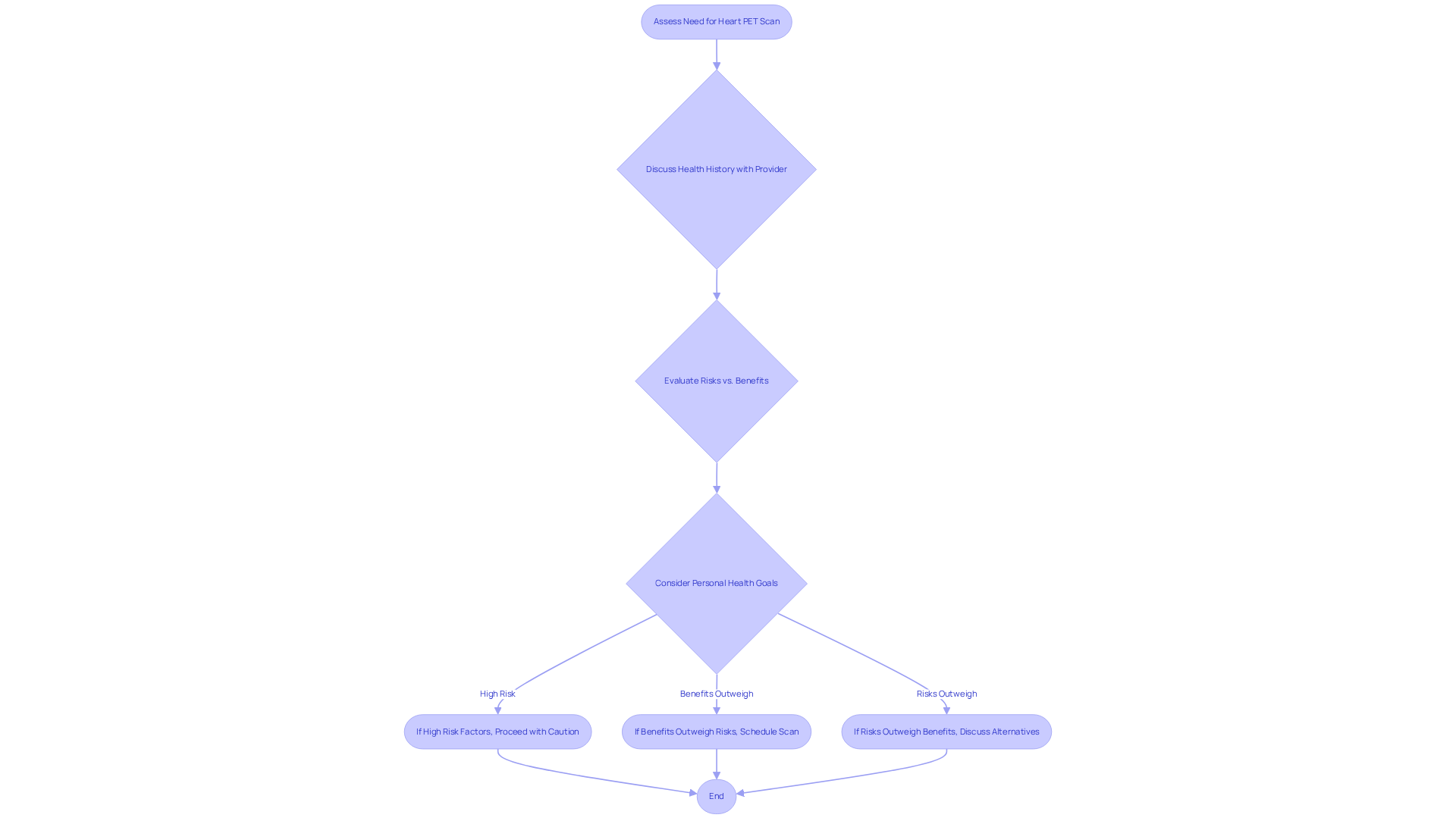


Heart PET scans play a vital role in diagnosing and managing cardiovascular health, especially when it comes to conditions like coronary artery disease and heart failure. These scans provide high-resolution imaging and assess metabolic function, helping to identify issues that may be concerning for you or your loved ones. It's important to know that the accuracy of these scans can lead to personalized treatment plans and early detection, which are crucial for older adults who might be facing multiple health challenges.
In addition to this, the benefits of Heart PET scans extend beyond just diagnosis. They can significantly enhance your overall care experience by allowing healthcare providers to tailor treatments specifically to your needs. This personalized approach not only addresses your unique health concerns but also fosters a sense of reassurance during a time that may feel uncertain.
Furthermore, the emphasis on early detection cannot be overstated. By identifying potential problems early on, you can take proactive steps toward better health management. This is particularly vital for older adults, as timely interventions can lead to improved outcomes and a better quality of life.
We understand that navigating health issues can be daunting, but remember, you are not alone. If you have any questions or concerns about Heart PET scans or your cardiovascular health, please reach out for support. Your well-being is our priority, and we are here to help you every step of the way.
Heart PET scans have emerged as a groundbreaking tool in cardiovascular health, offering remarkable insights into heart function and blood circulation. These advanced imaging techniques use radioactive tracers to uncover vital metabolic activities within the heart muscle. This makes them essential for diagnosing conditions such as coronary artery disease and heart failure. However, as these scans become more common, it’s important to consider their implications for patients, especially seniors who may face unique health challenges.
Understanding the procedure can feel overwhelming, but it’s crucial to know that you’re not alone. By interpreting the results and weighing the benefits against potential risks, you can make informed decisions about your cardiovascular care. How can these scans help you? They provide clarity and guidance, allowing you to take proactive steps towards better heart health. Remember, seeking support and information is a vital part of your journey towards wellness.
Heart PET scans represent a significant advancement in cardiovascular imaging. These examinations provide high-resolution images that reveal the heart's function and blood circulation. By utilizing radioactive tracers, they illustrate the metabolic functions within the heart muscle, which is essential for detecting serious conditions like coronary artery disease (CAD) and heart failure through a heart PET scan. This precision is especially beneficial for senior patients, who often face multiple health challenges. Heart PET scans can uncover issues that may remain hidden in standard assessments, enabling timely and effective interventions.
Recent studies indicate that the heart PET scan imaging boasts a diagnostic accuracy of approximately 85% for identifying CAD, surpassing traditional methods such as SPECT. This enhanced capability is crucial, especially since CAD is common among older adults and can lead to serious health complications if not detected early. Additionally, advancements in heart PET scan technology in 2025 have enhanced the accuracy of these imaging processes, allowing for better evaluation of myocardial blood flow and reserve—key indicators of cardiac health.
The benefits of heart PET imaging extend beyond diagnosis; they are vital in developing personalized treatment plans. By offering detailed insights into blood flow and pinpointing areas of tissue damage, healthcare providers can tailor interventions to meet individual needs, potentially lowering the risk of severe cardiovascular events. Thus, heart PET scan examinations play a pivotal role in enhancing cardiovascular health outcomes, particularly for senior patients who may require specialized care to manage their cardiac conditions effectively.
If you or a loved one are facing health concerns, consider discussing a heart PET scan with your healthcare provider. It may provide the clarity and support needed to navigate your cardiovascular health journey with confidence.

Preparing for a heart PET scan can feel daunting, but understanding the process can help ease your concerns. Typically, fasting for several hours before the procedure is recommended to ensure precise results. If you have diabetes, hypertension, or a family history of cardiovascular issues, you may also be advised to avoid caffeine and certain medications that could affect your heart's function. This heart PET scan is especially beneficial for individuals at high risk, as it provides detailed images that may reveal problems that traditional tests might miss.
During the examination, a small amount of radioactive tracer is gently injected into a vein, where it travels to your heart. You will then lie on a table that moves through a PET scanner, capturing images of your heart both at rest and during stress, which can be induced by exercise or medication. This advanced imaging capability reflects our commitment to delivering exceptional cardiovascular care, tailored to your needs.
Dr. Martinez-Clark, with her Harvard education and extensive expertise in cardiovascular health, ensures that the heart PET scan is included in a comprehensive care plan designed just for you. The entire process usually takes about 30 to 60 minutes, and we will observe you for a short time afterward to confirm there are no adverse reactions to the tracer.
Recovery is typically swift, allowing you to return to your regular activities soon after the examination. We may recommend drinking plenty of fluids to help flush the tracer from your system. Remember, we are here to support you every step of the way, ensuring your comfort and peace of mind as you take this important step towards better heart health.

Heart PET scan results are classified as either normal or abnormal. When findings are normal, it indicates that the heart is receiving sufficient blood flow and functioning well, which can provide reassurance to both patients and healthcare providers. However, abnormal findings may suggest reduced blood flow to the cardiac muscle, which a heart PET scan could potentially indicate, along with blockages or other cardiovascular issues. For instance, PET imaging may reveal areas of reduced perfusion, hinting at coronary artery disease or previous cardiac damage.
Understanding these results is particularly important for older individuals, who may experience different thresholds for what is considered normal due to age-related changes in heart function, which can be assessed using a heart PET scan. Research indicates that approximately 40-60% of older adults may exhibit abnormal PET imaging results, highlighting the importance of careful analysis and follow-up.
Patients are encouraged to engage in conversations with their healthcare providers to fully grasp the implications of their findings within the context of their overall health. This collaborative approach ensures that any necessary interventions or lifestyle changes can be implemented promptly, ultimately enhancing outcomes for individuals. Remember, your health matters, and seeking support is a vital step towards better well-being.

Heart PET imaging serves as a vital resource in promoting cardiovascular health, offering detailed visuals of heart function and blood flow that can lead to the early detection of potential issues. These scans are non-invasive and typically safe, exposing individuals to minimal radiation—equivalent to just three years of natural environmental exposure. While the use of radioactive tracers is associated with certain risks, rest assured that their application is meticulously controlled to guarantee safety for everyone involved.
For seniors, especially those with risk factors such as diabetes, hypertension, or a family history of cardiovascular issues, the benefits of early detection and accurate diagnosis often outweigh the slight risks involved. It's essential for individuals to discuss their overall health status and any pre-existing conditions with their healthcare provider. This conversation ensures that the decision to undergo a heart PET scan is in line with their health goals.
Engaging in this dialogue empowers patients to make informed choices about their cardiovascular care, ultimately enhancing their quality of life. Remember, your health matters, and taking proactive steps with your healthcare team can lead to a healthier future.

Heart PET scans represent a transformative approach in cardiovascular diagnostics, offering invaluable insights into heart health through advanced imaging technology. By accurately capturing the heart's function and blood flow, these scans play a crucial role in identifying conditions such as coronary artery disease and heart failure, particularly in older adults who may face heightened health risks.
Throughout this discussion, we have highlighted key aspects of heart PET scans, including:
The procedure is designed to be patient-friendly, ensuring comfort and clarity at every stage. With a high diagnostic accuracy rate, heart PET scans can uncover issues that traditional methods may overlook, enabling healthcare providers to develop tailored treatment plans that enhance patient outcomes.
Ultimately, the significance of heart PET scans extends beyond mere diagnostics; they empower you to take an active role in your cardiovascular health. Engaging in informed discussions with your healthcare provider about the necessity and benefits of heart PET scans can lead to timely interventions and improved quality of life. Embracing this proactive approach to heart health is essential for individuals like you who seek to navigate their cardiovascular journey with confidence and assurance.
What is a heart PET scan?
A heart PET scan is a diagnostic imaging test that provides high-resolution images of the heart's function and blood circulation by utilizing radioactive tracers to illustrate the metabolic functions within the heart muscle.
Why are heart PET scans important for cardiovascular health?
Heart PET scans are important because they help detect serious conditions like coronary artery disease (CAD) and heart failure, which may not be visible in standard assessments. They enable timely and effective interventions, especially for senior patients who often face multiple health challenges.
How accurate are heart PET scans in diagnosing coronary artery disease (CAD)?
Heart PET scans have a diagnostic accuracy of approximately 85% for identifying CAD, which is higher than traditional methods such as SPECT.
What advancements have been made in heart PET scan technology?
Recent advancements in heart PET scan technology as of 2025 have enhanced the accuracy of these imaging processes, allowing for better evaluation of myocardial blood flow and reserve, which are key indicators of cardiac health.
How do heart PET scans contribute to personalized treatment plans?
Heart PET scans provide detailed insights into blood flow and identify areas of tissue damage, enabling healthcare providers to tailor interventions to individual needs, potentially lowering the risk of severe cardiovascular events.
Who can benefit most from heart PET scans?
Senior patients, in particular, can benefit from heart PET scans as they may require specialized care to manage their cardiac conditions effectively.
Should I consider a heart PET scan if I have health concerns?
Yes, if you or a loved one are facing health concerns, it may be beneficial to discuss the option of a heart PET scan with your healthcare provider to gain clarity and support in navigating your cardiovascular health journey.